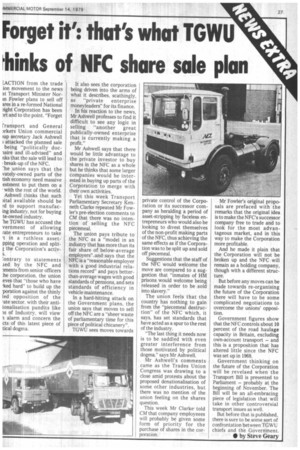Forget it': that's what TGWU hinks of NFC share sale plan
Page 29

If you've noticed an error in this article please click here to report it so we can fix it.
ACTION from the trade ion movement to the news at Transport Minister Norin Fowler plans to sell off Ares in a re-formed National ?:ight Corporation has been )rt and to the point. "Forget Eransport and General )rkers Union commercial nip secretary Jack Ashwell attacked the planned sale being "politically doclake and ill-advised" and aks that the sale will lead to break-up of the NFC.
he union says that the vately-owned parts of the tish economy need massive estment to put them on a . with the rest of the world. Ashwell thinks that such )ital available should be to support manufacing industry, not for buying te-owned industry.
he TGWU has accused the vernment of allowing rate entrepreneurs to take 1 in a ruthless assetpping operation and split; the Corporation's activs.
:ontrary to statements J ed by the NFC and aments from senior officers he corporation, the union eves that "those who have ted hard" to build up the poration against the thinly led opposition of the ,ate sector, with their antiionalisation pundits like is of Industry, will view a alarm and concern the cts of this latest piece of tical dogma. It also sees the corporation being driven into the arms of what it describes, scathingly, as "private enterprise moneyleaders" for its finance.
In his reaction to the news, Mr Ashwell professes to find it difficult to see any logic in selling "another great publically-owned enterprise that is currently making a profit."
Mr Ashwell says that there would be little advantage to the private investor to buy shares in the NFC as a whole but he thinks that some larger companies would be interested in buying up parts of the Corporation to merge with their own activities.
Yet this week Transport Parliamentary Secretary Kenneth Clarke repeated Mr Fowler's pre-election comments to CM that there was no intention of selling the NFC piecemeal.
The union pays tribute to the NFC as a "model in an industry that has more than its fair share of below-average employers".and‘ says that the NFC is a "reasonable employer with a good industrial relations record" and pays betterthan-average wages with good standards of pensions, and sets standards of efficiency in vehicle maintenance.
In a hard-hitting attack on the Government plans, the union says that moves to sell off the NFC are a "sheer waste of parliamentary time for this piece of political chicanery".
TGWU sees moves towards private control of the Corporation or its successor company as heralding a period of asset-stripping by faceless entrepreneurs who would also be looking to divest themselves of the non-profit making parts of the NFC, thus achieving the same effects as if the Corporation was to be split up and sold off piecemeal.
Suggestions that the staff of the NFC would welcome the move are compared to a suggestion that "inmates of HM prisons would welcome being released in order to be sold into slavery."
The union feels that the country has nothing to gain from the "piecemeal destruction" of the NFC which, it says, has set standards that have acted as a spur to the rest of the industry.
"The last thing it needs now is to be saddled with even greater interference from those motivated by political dogma," says Mr Ashwell.
Mr Ashwell's comments came as the Trades Union Congress was drawing to a close amid protests about the proposed denationalisation of some other industries, but there was no mention of the union feeling on the shares question.
This week Mr Clarke. told CM that company employeees will probably be given some form of priority for the purchase of shares in the corporation. Mr Fowler's original proposals are prefaced with the remarks that the original idea is to make the NFC's successor company free to trade and to look for the most advantageous market, and in this way to make the Corporation more profitable.
And he made it plain that the Corporation will not be broken up and the NFC will remain as a holding company, though with a different structure.
But before any moves can be made towards re-organising the future of the Corporation there will have to be some complicated negotiations to overcome the unions' opposition.
Government figures show that the NFC controls about 10 percent of the road haulage capacity in Britain, excluding own-account transport — and this is a proposition that has altered little since the NFC was set up in 1968.
Government thinking on the future of the Corporation will be revelaed when the Transport Bill is presented to Parliament — probably at the beginning of November. The Bill will be an all-embracing piece of legislation that will take in other controversial transport issues as well.
But before that is published, there is sure to be some sort of confrontation between TGWU chiefs and the Government.
• by Steve Geary




















































































































































